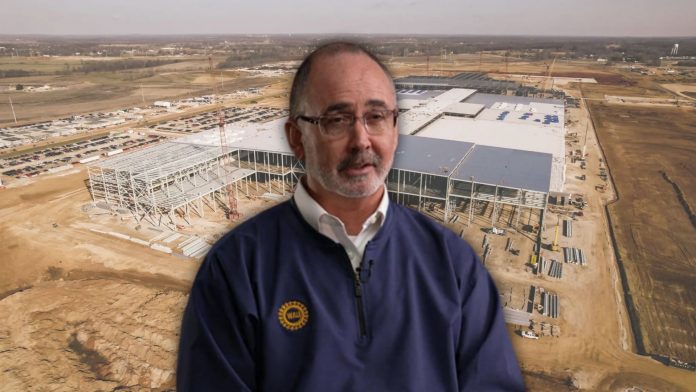Employees at the BlueOval SK Battery Park in Glendale, Kentucky, have officially launched a public campaign to join the United Auto Workers (UAW), marking a significant move toward union representation in the burgeoning electric vehicle (EV) battery industry.
The announcement comes as a “supermajority” of workers at the nearly $6 billion facility signed union authorization cards, citing safety concerns and fair compensation as primary motivators.
The BlueOval SK Battery Park, a joint venture between Ford and South Korean company SK On, is a cornerstone in establishing Kentucky as the “EV capital of the U.S.” The massive battery park consists of two facilities, with production set to begin next year at the first, known as Kentucky 1. Once the project becomes fully operational, it will create 5,000 jobs in the region. Governor Andy Beshear reports that the Glendale plant has already assigned 750 of the 1,100 workers hired.
Starting pay at the facility is $21 per hour, potentially reaching $37.50 based on experience. However, the UAW has highlighted a disparity in wages between these workers and Ford’s unionized production employees, who start at $26.32 per hour and can earn over $42 per hour after three years. This wage gap has fueled the push for unionization, alongside worker concerns over hazardous chemical exposure and workplace safety.
UAW President Shawn Fain, who led historic strikes at Ford, General Motors, and Stellantis in 2023, is now focusing on securing union representation at battery plants like BlueOval SK. While the union could not secure automatic unionization of battery plants in its recent National Master Agreement with Ford, it successfully negotiated a contract for workers at Ultium Cells in Lordstown, Ohio. The UAW aims to replicate that success in Kentucky.
The next step in the process will depend on whether BlueOval SK voluntarily recognizes the union or requires an election through the National Labor Relations Board. In the meantime, the campaign has drawn attention to the evolving dynamics of labor rights in the EV supply chain, a critical component of the auto industry’s future.



